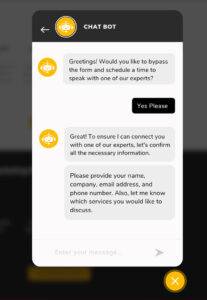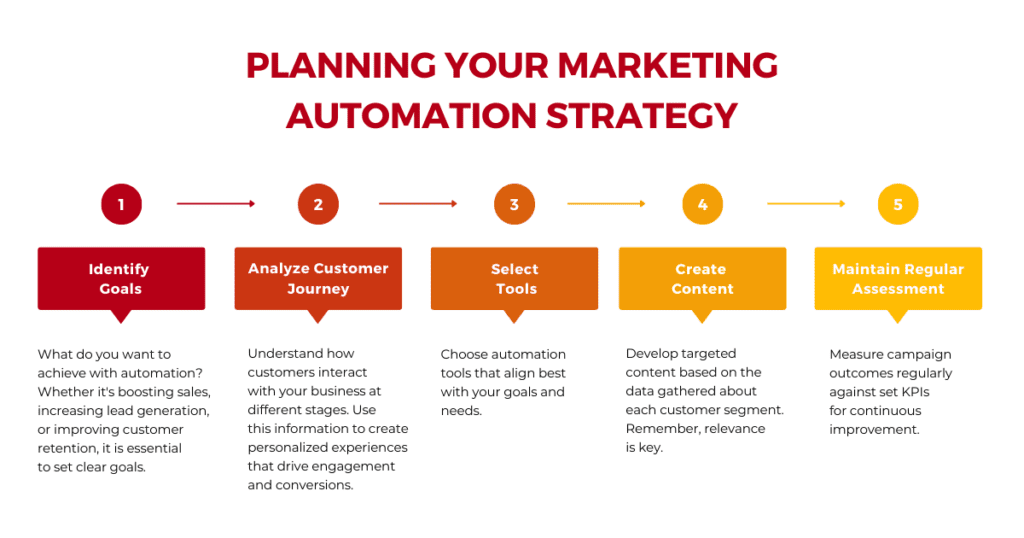Table of Contents
Need tips to get your marketing automation strategy started? Trust the experts at RedShift Digital Marketing
Are you optimizing your marketing efforts? If you aren’t, there is a good chance that you are falling behind the curve. In order to maximize your results and streamline your processes, you need to be using marketing automation tools.
Today, we’re going to be learning about the fundamentals of a robust marketing automation strategy and highlighting its importance in today’s digital landscape. We’ll also explore various tools for implementing this strategy, including tools for email automation, social media automation, and CRM automation.
We’re going to walk you through the process of planning and optimizing your approach using lead nurturing techniques to increase customer retention. You’ll also learn how social media can be leveraged to reduce churn rates significantly.
Additionally, we’ll shed light on building accurate buyer personas using social media data—which is an essential step toward personalizing customer interactions. Small businesses stand to gain immensely from employing automated processes.
Finally, we will discuss how AI chatbots are working as automated lead-generation tools. At RedShift, our team is constantly searching for the best ways to streamline marketing efforts for our clients. Keep reading to learn more about the power of automation and why you need to make automation a core aspect of your marketing efforts. Let’s get started!
Table of Contents
What is a Marketing Automation Strategy?
Let’s explore the benefits of a marketing automation strategy before you begin introducing new tools to your business
A marketing automation strategy is like having a personal assistant for your marketing efforts. It uses clever software to automate tasks, make your life easier, and create results for your company. It’s like having a robot that does the most tedious tasks so that you can focus on what is really important.
A marketing automation strategy is about using available technology to streamline your marketing activities. And, when used strategically, it can supercharge your results.
Why is a Marketing Automation Strategy Important?
Without a marketing automation strategy, you are going to be quickly falling behind your competitors. There are so many tools currently available to help automate your marketing process. If you aren’t taking advantage of the tools that are out there, your marketing strategy is already outdated. Let’s take a look at a few of the most important reasons why your business should be incorporating a marketing automation strategy to make your business more efficient.
- Better customer segmentation: With marketing automation, you can gather customer information from various channels and segment your audience based on their preferences. Previously, this process would have been completed manually—which takes far longer.
- Elevated lead generation: Marketing automation ensures no potential leads slip through the cracks. With the right automation tools, you can begin moving leads down the sales funnel without lifting a finger.
- Better sales process: By automating parts of the sales funnel, your sales team can focus on closing deals instead of getting bogged down by administrative tasks—it’s like having a personal assistant for your sales team.
So, if you want to level up your marketing game, embrace the power of marketing automation! With the time saved thanks to automation, you can focus on creating your overall marketing strategy.
Tools for Boosting Your Marketing Automation Strategy
Not sure how to start automating your marketing strategy? Let’s take a look at some of the tools you should be using
There are some exciting tools that can supercharge your marketing automation strategy. Let’s explore some of the types of tools you should be looking out for in order to optimize your marketing strategy.
Email Automation
Email automation allows you to send personalized and timely messages to large numbers of customers, leads, or prospects. This type of automation improves efficiency and engagement rates.
Email automation also helps nurture relationships with customers, aiding in lead conversion and customer retention. The right email automation software will also provide valuable data about customer behavior, facilitating better segmentation and more effective marketing strategies. Make sure to do your research before deciding on the right automation software!
Social Media Automation
Social media automation is important for your marketing strategy because it ensures consistency and frequency in posting. This type of automation allows businesses to plan and schedule content in advance, freeing up time to focus on strategy. By using automation, businesses can reach audiences in different time zones effectively, ensuring a global reach. It also provides valuable analytics, helping businesses understand audience behavior and refine their strategies.
CRM Automation
CRM (customer relationship management) automation enables businesses to streamline their customer interactions, improve engagement, and personalize customer experiences. An automated CRM handles repetitive tasks, allowing teams to focus more on strategic activities. CRM automation provides insights into customer behavior and preferences, which can inform more effective and targeted marketing campaigns.
All these tools are essential for well thought-out marketing automation strategy. They streamline internal operations, automate communication channels, and free up time for strategic planning. Say goodbye to manual tasks and hello to a fully optimized marketing strategy!
Planning Your Marketing Automation Strategy
Now that you have your tools, it’s time to flesh out your automation strategy
A successful marketing automation strategy takes time and requires careful planning. From the moment they first interact with your brand to when they become loyal advocates, every touchpoint matters.
Steps to Plan Your Approach
- Identify Goals: What do you want to achieve with automation? Whether it’s boosting sales, increasing lead generation, or improving customer retention, it is essential to set clear goals.
- Analyze Customer Journey: Understand how customers interact with your business at different stages. Use this information to create personalized experiences that drive engagement and conversions.
- Select Tools: Choose automation tools that align best with your goals and needs.
- Create Content: Develop targeted content based on the data gathered about each customer segment. Remember, relevance is key.
- Maintain Regular Assessment: Measure campaign outcomes regularly against set KPIs for continuous improvement.
Once you’ve planned your approach and found your tools, you’re ready to set your marketing automation plan into motion.
The Importance of Regularly Assessing Campaign Outcomes
To ensure success in implementing an automation strategy, it’s important to consistently track performance metrics. The real power lies not just in automating tasks—but also in using these tools as an opportunity for learning and refining strategies over time.
For instance, if you notice certain emails are not generating desired open rates or click-through rates (CTR), then it might be time for some A/B testing. Experimenting with different subject lines, CTAs, or even sending times can provide valuable insights into what works best for your audience.
In essence, regular assessment allows businesses to stay agile and adapt their strategies according to evolving consumer behavior patterns.
Optimizing Lead Nurturing with Automation Tools
With the right strategy in place, you can turn new leads into devoted customers
An essential part of inbound marketing is nurturing leads. This process can be significantly improved with automation tools. Automation tools can be used to ensure that your customer interactions are maintained and that your website and social media presence remain current.
Increasing customer retention with personalized emails
Nurturing leads involves building relationships with potential clients throughout the sales funnel and after they’ve made a purchase. With email automation tools, you can automate personalized emails based on your prospects’ interactions.
Reducing churn rates with social media integration
Social media offers companies the ability to converse with their patrons in a timely manner. When you integrate an automated system, it becomes easier to manage multiple accounts and track user engagement.
This integration also helps reduce churn rates by providing timely responses and relevant content. For example, if a client posts about difficulty navigating your site, an automated response can guide them to helpful resources immediately.
Building Buyer Personas Using Social Media Automation
Gain helpful insights about your target audience thanks to social media automation tools
Social media is a powerful tool for businesses. Now, you can use these automated platforms to create accurate buyer personas and supercharge your marketing efforts.
A buyer persona is an expression of your ideal customer or group of customers. It helps you understand your audience better, tailor your content to their needs, and align your whole company toward meeting those needs.
Methods To Build Accurate Buyer Personas
To create effective buyer personas using social media, follow these steps:
- Analyze user behavior – See how users interact with brands like yours on different platforms. It’s like being a social media detective.
- Gather demographic information – Use analytics tools provided by platforms like Twitter Analytics. They’ll give you valuable info about your followers.
- Survey Your Audience – Ask questions or conduct surveys through social media posts or polls. It’s like having a direct line to your potential customers!
These automated social media tools will help you build the most accurate and helpful buyer personals for your company. From there, you can regularly pull data from your social media tools in case you need to make any changes.
Automation Advantages For Small Businesses
As a small business, you have a lot to gain from a marketing automation strategy
Small businesses face unique challenges in marketing, but using marketing automation can be a game-changer. It categorizes data and automates tedious tasks, so you can focus on growing your business.
Benefits for Small Businesses with Marketing Automation
- Better Time Management: Let automation tools handle repetitive tasks, giving you more time for strategic initiatives.
- Informed Decision Making: Access real-time analytics and reports to make data-driven decisions instead of relying on gut feelings.
- Cohesive Customer Experience: Deliver consistent messaging across platforms for a seamless customer experience.
- Scaled Growth: Scale your automation system as your business grows so you won’t outgrow your technology too quickly.
An effective marketing automation strategy streamlines operations and provides valuable insights into customer behavior patterns. It saves costs and boosts productivity, making it a smart investment for small business owners planning future expansion.
The Role of Chatbots in Boosting Lead Generation
Use chatbots to engage your target audience and optimize your lead generation strategy
The digital era has birthed numerous innovations, including the rise of chatbots. These AI-powered tools have revolutionized customer engagement and turbocharged lead generation. With their fast responses, chatbots are more popular than ever for businesses of all sizes.
Chatbots are transforming how companies connect with their customers. By providing instant assistance and prompt answers, they significantly elevate consumer engagement. According to Forbes, a staggering 73% of businesses plan to integrate chatbots into their operations by 2023.
Tips for Deploying a Chatbot
- Personalization: Customize chatbot responses based on user data and behavior patterns, creating more relevant and captivating interactions.
- Simplicity: Ensure a user-friendly chatbot interface, allowing seamless navigation without frustration or confusion.
- Data Analysis: Use insights from conversations between your bot and customers to refine future interactions and enhance the overall experience.
In a nutshell, integrating chatbot technology into your marketing automation strategy amplifies lead generation capabilities and provides invaluable insights into customer preferences and behaviors. With careful planning, you can harness this tool effectively to drive business growth.
FAQs About Marketing Automation Strategies
How do you develop a Marketing Automation Strategy?
You can develop one by identifying your goals, choosing the right marketing software, segmenting your audience, creating content tailored to each segment, and regularly assessing campaign outcomes.
How is Marketing Automation changing the Strategic Marketing Process?
Marketing automation streamlines repetitive tasks, allows for more personalized communication with customers at scale, and provides data-driven insights to improve strategies over time.
Marketing automation is key to success, no matter the size of your business or your industry. It streamlines processes, nurtures leads, and optimizes your customer engagement. Email automation, social media automation, and CRM automation can all help businesses implement their strategies.
Remember to assess campaign outcomes regularly to maximize automation benefits. Only by staying up to date on the latest user behavior can you guarantee that your strategy is still effective. If you aren’t sure where to start when it comes to marketing automation for your business, schedule a call today with the experts at RedShift. Our team is dedicated to finding the right solutions to maximize your reach and optimize your lead generation efforts.




